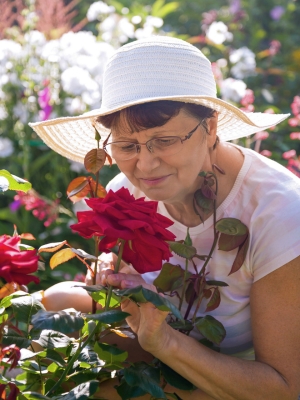
Category: Cooperative Extension

Tending to the Gardener: Eight Tips for Safer Gardening
July 06, 2023 Written by Susan Graves, Master Gardener (2021), New Castle County
Year-round, but especially in the heat of the summer, it's important to take steps to make sure you're gardening safely. Remember: You must care for the gardener now for a lifetime of gardening. Here are eight tips to do just that!
- Stretching for a few minutes before and after working in the garden goes a long way to staying strong and injury-free.
- Have drinking water on hand (don’t forget to drink it)! Keep the water bottle in one spot as you move around the garden – this encourages standing and walking to the bottle, which helps prevent cramps and can keep you limber.
- Let your physician know you are a gardener, as scratches and other injuries can lead to infection if not treated promptly. Discussing tetanus risk is also a good idea.
- Scraping your nails across a bar of soap before weeding can prevent dirt from collecting under the nails and washing out easily afterward. A good nail brush by the sink is worth its weight in gold.
- Create portable shade by using a small hand truck to cart a patio umbrella in its weighted base.
- Wear sunscreen. Regardless of your tendency to burn, applying sunscreen 15 minutes before going outside will reduce exposure to UV rays.
- Wear a good wide-brimmed hat that also covers the back of your neck is essential to sun protection and keeping cool. Lightweight hats and removable garden sleeves made from UV-protecting fabric can also reduce scratches and protect from bug bites.
- Garden one hour at a time to help prevent fatigue from over-working (especially when there is more work than energy!)


Of course, the tips don't end here! University of Delaware’s Cooperative Extension and Delaware Master Gardeners are always here to help. For more information, contact the Master Gardener Helplines and check out our “Garden Smart, Garden Easy” resource for more tips and tricks for gardening safely!
